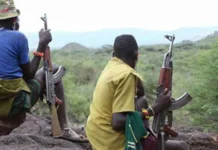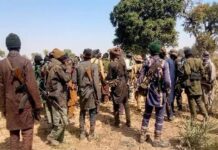The shutdown of telecom services and other measures to curb insecurity, a quick reflection, by Isaac Ochegbudu
On the 29th of September 2021, Mr Samuel Aruwan the Commissioner, Ministry of Internal Security and Home Affairs, Kaduna State announced the implementation of certain measures to assist security agents in the State. This announcement came weeks after similar measures were taken in Katsina, Zamfara and Sokoto states. Some of these measures include the shutdown of telecom services in parts of the state, the complete ban on motorcycles (for personal and commercial use), the restriction of the movement of tricycles from 7 Pm to 6 AM, the ban on firewood and charcoal transportation, cessation of weekly markets in some local governments amongst other measures.
Since the implementation of these measures, many concerns have been raised, it has also sparked up some debates. One of the issues it raises is, would these measures yield any positive results? since similar measures failed to lead to the crushing of terrorism in the Northeast a few years ago. It could be recalled that in 2013, the Goodluck Jonathan regime shut down telecommunication services in 3 affected North-East states battling with terrorism, at a point the use of motorcycles was also banned. The aim of these measures is to frustrate the terrorist and it is expected to bring out a positive result. Sadly it never did as we still continue to battle with the menace of terrorism and the expansion of similar security challenges today. In my own view, since it didn’t work in the Northeast some years back, I don’t think it will work now.
In the comment section of Babangida Ruma’s Facebook post on 29th October 2021, where he asked “Does the suspension of telecom services help in tacking insecurity?”, the Majority of the response is NO. Those responding from the axis of Katsina, Zamfara and Sokoto state where the same move was made before Kaduna is horrid. Some of them report that the measures have not done any good, it has placed villagers in dire condition as bandits now easily attack villages and the villagers cannot report, it has created a communication gap. In spite of the suspension of telecom services and the ban on motorcycles, banditry and kidnapping still thrive in these states, this is not different from Kaduna state as there are still reports of kidnappings and banditry attacks.
Another question that comes to mind is what is the use of the NIN-SIM linkage? Did the Minister of Communication and Digital Economy Dr Isa Pantami not tell us the aim of the linkage is to curb insecurity? months after the beginning of the NIN-SIM linkage exercise, has insecurity increased or decreased? If the NIN-SIM linkage is to curb insecurity, why do we need the implementation of such security measures which is causing severe pain and inconveniences?
READ ALSO: What six billion naira can do for my state, by Hassan Gimba
Now looking at the implications of these measures. One of the duties of policymakers is to carefully consider the implications of a policy before implementing them and if people must suffer from the implementation of policies, the outcome must be large and long-term beneficial, sadly this is not the case in Nigeria. Most times policymakers just take decisions that are most times unfruitful and the masses suffer.
Since the shutdown of telecommunication services, banning of motorcycles, restriction of the movement of tricycles, the ban on the selling of petrol in jerrycans, the cessation of some markets, and other measures, the people of Kaduna and other Northwestern states with similar measures in place have suffered serious socio-economic and psychological hardships.
The means of livelihood of many common men/women have been taken away from them as many rely heavily on such activities to survive. Transportation has become a serious challenge as there are limited means of transportation, while bus drivers and tricycle riders exploit the masses by hiking transportation fares. In the words of Gimba Kankada in his article titled ‘What next after these shutdowns? ‘ he said: “Almost all the things that have kept economically disadvantaged in Nigeria alive have either been banned or suspended and these comprise, commercial motorcycles, sales of fuel in jerrycans, sales of petroleum products in marked areas, weekly markets, transportation of livestock”
Businesses have been badly affected, workers have to suffer to get to their workplaces and suffer to come back home. With the daily increase in the price of goods and commodities and strained economic conditions, the closure of some markets limits the circulation of goods and commodities. As the price of cooking gas increases, many can not resort to the use of either firewood or coal as an alternative because transporting of these are banned, where available, the cost is high.
Students in these areas are in worse situations than ever, they are unable to communicate with their people and this alone has serious psychological implications. They lack access to the internet for assignments and communication.
One of the implications of shutting down telecom services is that it affects communication which is very crucial to human life at this time. All these and more contribute to generating concerns. For residents of Kaduna, this is one of the most difficult situations ever to befall them.
From all indications, it is obvious that Nigeria is yet to find the actual direction to the solution of insecurity that bedevils our nation. As we keep on turning in circles of solutions that yield no positive result and neglect the necessary things to do to solve the problem.
One of my lecturers who is a respected sociologist and criminologist at BUK and Kano state, Ibrahim Bello, (PhD) emphasized that until there is a sociological study and approach to the insecurity in Nigeria, the problem will never be solved. He said they have made a recommendation for a sociological study and approach to the situation at different times but the government has not agreed to it. He emphasized that a sociological study will holistically look into the issue and bring up every factor contributing to the challenge.
It is my prayer that government will reconsider its decision as the masses are seriously suffering and the situation has barely improved.
Isaac Ochegbudu, a freelance opinion writer/social analyst, sociologist and teacher. He can be reached via email: isaacochegbudu@gmail.com, and phone: 08106194657, 09047416032.
Follow the Neptune Prime channel on WhatsApp:
Do you have breaking news, interview request, opinion, suggestion, or want your event covered? Email us at neptuneprime2233@gmail.com





